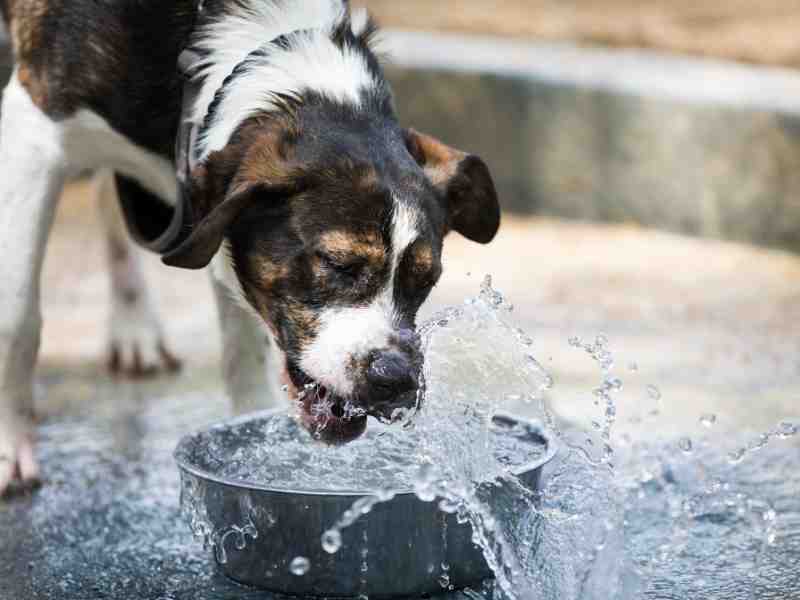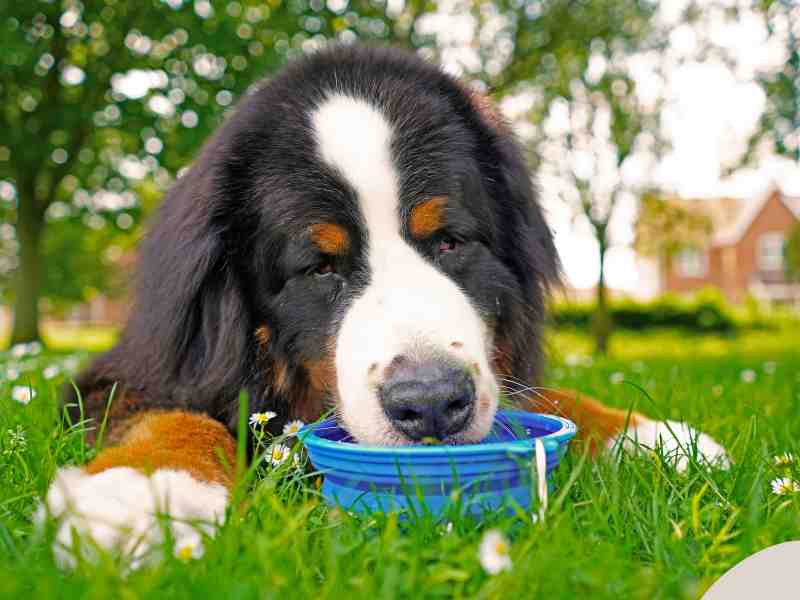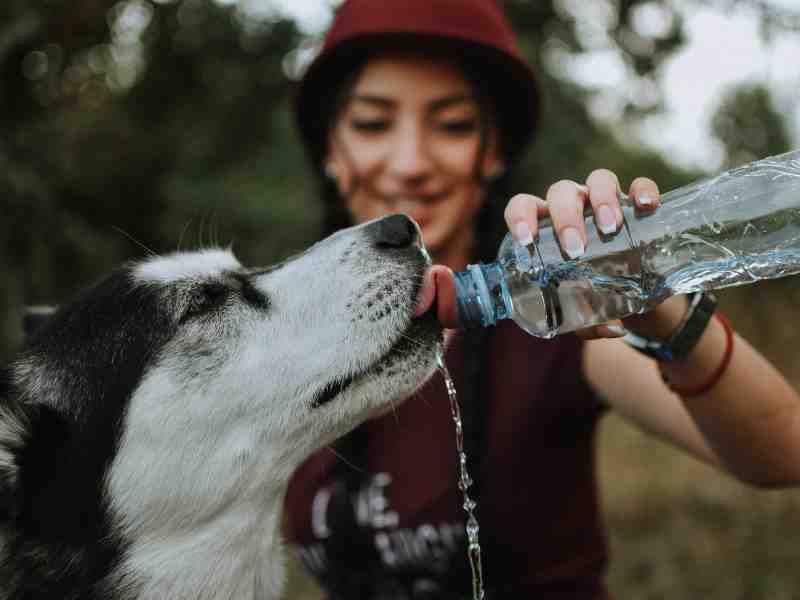It’s a topic that’s crucial for every furry best friend’s well-being: hydration and mobility in dogs. At first glance, water might just seem like a basic necessity, but it’s actually a powerhouse element in keeping your dog moving and grooving. Water is more than just a thirst-quencher for your pup—it’s a key player in their mobility and overall health.
Understanding Dog Hydration
Hydration for dogs goes way beyond just avoiding thirst. It’s about maintaining the balance of bodily fluids that are fundamental to every aspect of their health. Think of water as the unsung hero in your dog’s body—it’s involved in everything from regulating body temperature to digesting food.
But there’s more! Hydration plays a key role in your dog’s mobility. Water makes up a significant portion of muscle tissue, and it’s critical for muscle elasticity and strength. A well-hydrated dog will have muscles that are limber and ready for action, whether it’s a sprint to catch a ball or a leap onto their favorite sofa spot.
Joints are another area where hydration shows its might. Joint cartilage, which ensures smooth movement between bones, is like a sponge. It needs to stay hydrated to be effective. Dehydrated cartilage can become stiff and less effective at cushioning your dog’s movements, leading to discomfort and reduced mobility.
So, when we talk about keeping our dogs hydrated, we’re not just ensuring they have enough water to drink. We’re talking about supporting their muscular strength, joint health, and overall ability to move freely and happily. It’s about giving them the best shot at a physically active and pain-free life. That’s why understanding and managing your dog’s hydration isn’t just a part of good care—it’s a crucial aspect of their overall wellness.
Dehydration In Dogs: How Can I Tell If My Dog Is Dehydrated?
Dehydration in dogs is a serious condition that can lead to impaired organ function, including a reduction in blood volume. It’s really dangerous for puppies, senior dogs, nursing mothers, and toy breeds due to their higher water requirements or lower reserves. Dehydration can be caused by lack of water intake, excessive heat, illness, or fever.
To prevent dehydration, make sure your dog always has access to clean, fresh water. You can offer small amounts of water or electrolyte solutions at home for mild dehydration, but severe dehydration requires immediate veterinary attention and possibly intravenous fluids.
It’s important to recognize these signs early and take appropriate action, as prolonged dehydration can lead to organ damage and other serious health issues. If you notice any of these symptoms in your dog, especially if they are severe or persistent, consult a veterinarian immediately.
- Excessively Dry Nose and Gums: When a dog is dehydrated, their nose and gums may become dry or crusty. This is a sign that their body isn’t retaining as much moisture as it should.
- Sunken Eyes: Dehydration can cause the fat pads behind a dog’s eyes to lose plumpness, which gives them a sunken appearance. This is a severe sign of dehydration and requires immediate veterinary attention.
- Poor Skin Elasticity: Gently pulling up on the skin at the back of your dog’s neck can test skin elasticity. If the skin doesn’t immediately spring back, it indicates dehydration. The longer the skin takes to return to normal, the more severe the dehydration.
- Capillary Refill Time: Pressing a finger against your dog’s gums until they turn white and then removing it can test capillary refill time. Your dog could be dehydrated if the gums don’t regain color immediately.
- Weakness or Lethargy: Dehydrated Dogs might exhibit weakness, lethargy, or a decrease in their normal activity levels.
- Vomiting or Diarrhea: These symptoms can lead to a rapid loss of fluids and electrolytes, worsening dehydration.
Hydration Needs for Dogs: How Much Water Do They Really Need?
Determining how much water a dog needs isn’t a one-size-fits-all situation. Several factors come into play, including the dog’s size, age, and activity level.
- Size Matters: Generally, dogs need about one ounce of water per pound of body weight per day. So, a 30-pound dog would typically require around 30 ounces of water daily. However, larger dogs with higher metabolic rates and greater body mass will naturally require more water.
- Age and Life Stage: Puppies grow quickly and often need more water than adult dogs of the same weight. Senior dogs, too, might have specific health issues affecting their water intake, such as kidney disease, which can lead to increased thirst. Some conditions like Cushing’s or Addison’s may also increase their thirst.
- Activity Level: Active and working dogs will undoubtedly drink more. Whether they’re herding, participating in agility, or just going along with you on long hikes, these dogs lose more water through panting and sweating and thus need more to replenish their bodies.
- Working and Highly Active Dogs: For working dogs or those engaged in high activity levels, their water needs can increase significantly. It’s crucial to provide these dogs with more frequent opportunities to drink, especially during and after periods of activity.
Benefits of Hydration For Improving Dog Mobility
Diving into the science, it’s pretty clear that staying hydrated is a big deal for our furry friends. It’s all about keeping those joints moving smoothly. Water works like a natural lubricant for the joints, meaning less grind and more playtime without the ouch. Well-hydrated dogs are happier because they can jump, run, and play without the creaks and groans of stiff joints.
About muscles, think of water as their built-in cooling system. One study showed that dogs who get enough hydration before they start working or playing hard can keep cooler and their muscles don’t get as stressed. It’s like having a built-in air-con for their muscles, which is pretty cool (see what we did there?).
Then there’s this thing with water workouts. Yep, it’s a thing. Put a dog on a water treadmill, and you can see how the right amount of water can really kick their muscle game up a notch. It’s not just fun; it’s science-backed fun that’s good for them and shows the importance of hydration.
As for energy levels, it’s a well-known anecdotal fact that a hydrated dog has more pep in their step. It’s all about keeping their internal processes, like metabolism and digestion, running as smoothly as it can.
Keeping that water bowl filled to the brim is not just helping your dog quench its thirst but fueling your dog’s zest for life. It’s simple: water equals wellness, and that’s something both science and your pup can agree on.
How Can I Make Sure My Dog’s Body Gets The Water It Needs?
Want some tips to make sure your dog gets all the water it needs? Here are some ways to ensure your dog’s water intake keeps it healthy and happy!
- Have Water Everywhere: Just like us, dogs need easy access to water. Set up a few water stations around the house – think of them like mini watering holes for your furry friend.
- Bowl Preferences: Does your dog turn up their nose at their water bowl? They might just be picky about the decor. No, it’s true! Try out different bowls to see what strikes their fancy. You might be surprised what they end up liking.
- Tasty Water: Got a dog who just doesn’t seem to like plain water? A splash of low-sodium chicken broth could do the trick. Just keep it light – too much, and you’re in soup territory. It’s important to keep them hydrated but without a lot of excess sodium.
- Keep Tabs on Drinking Habits: Do you notice your dog’s water bowl is full? Or maybe it’s emptying faster than a leaky bucket? These could be signs that something’s up, so keep a watchful eye. This is often how dog parents relay information to their vets that leads to diagnoses of diabetes and Cushing’s.
- Hydration to Go: If you’ve got an adventurous pup, grab a portable water bottle or a collapsible bowl for those long walks or park adventures. It’s like a travel mug, but for dogs, and it’s important they always have water when they need it.
- Food for Thought: Remember, if your dog’s diet is kibble-heavy, they’ll need more water. Wet food helps keep them a bit more hydrated, so water that food down and create a true gravy bowl.
- Set a Water Refill Reminder: Life gets busy, but a simple routine for topping up water bowls can make all the difference. And it’ll help you notice if their drinking patterns change. There’s no shame in the reminder; it ensures your best friend always has the water they need.
- Know the Signs: Look for any clues that your dog isn’t getting enough water. If they’re suddenly not drinking or drinking too much, it’s time for a vet visit.
Hydration And Health From The Inside Out
Water’s not just vital for your dog’s health – it’s a daily necessity. Get the basics right, and your dog will thank you with happy licks and energetic tail wags. And always, if you’re unsure or something seems off, check in with your vet. They’re the hydration heroes, after all. But…your dog being well-hydrated is just part of the healthy dog equation.
You should always ensure that your furry friends have constant access to fresh water. Monitoring your dog’s intake and encouraging regular drinking with clean bowls, flavored water, or incorporating wet food are all part of a robust hydration strategy.
But good mobility, which is what lets your dog live its best life, also starts from the inside out. That’s why we created Bernie’s Marvelous Mobility and Bernie’s Healthy Hips. These formulas are not just about hydration; they support your dog’s mobility through gut health.
We wanted to make sure our own two family dogs had the best movement and mobility and knew it included excellent hydration as well as supplementation. We looked for the best of the best when it came to ingredients. We found that what’s been popular in the joint supplement world isn’t really what the most current research supports as the best for mobility. Instead, we chose these science-backed ingredients to give our dogs a holistic approach to mobility:
- Omega Fatty Acids from Flaxseed, Anchovy, and Algal Oil support joint health and can help maintain a shiny coat and healthy skin, which are indicators of good hydration levels.
- Antioxidants like Astaxanthin and Blueberries combat the oxidative stress that can affect a dog’s mobility and overall vitality.
- Anti-inflammatories like Turmeric/Curcumin and Green Tea Extract, support the body’s natural response to inflammation, which is crucial for healing and mobility.
- Vitamins like Vitamin C and Vitamin K2 are essential for collagen synthesis and bone strength, complementing the hydration that keeps joints lubricated.
- Collagens and Proteins in the form of Undenatured Type-II Collagen are building blocks for maintaining strong and healthy cartilage in the joints.
- Trace Elements and minerals like Boron are pivotal in cellular functions and bone health.
Bernie’s Best products aren’t about what goes in your dog’s water bowl, but what works best within your dog’s digestive system to ensure they have the best gut health. This, combined with excellent hydration, keeps them their happiest. Ensuring their gut health is optimized to absorb and utilize every drop of that water and every nutrient ingested is the holistic approach to keeping your dog as mobile as a puppy, whether they’re bounding after a ball or scaling a hiking trail beside you.
Let’s keep those water bowls full, YES! But let’s also make sure they’re getting the comprehensive support their bodies need for overall health and mobility. By combining proper hydration with the nutrient-rich ingredients we put in Bernie’s Marvelous Mobility and Bernie’s Healthy Hips, we’re setting our four-legged companions up for a lifetime of happy, healthy movement!


